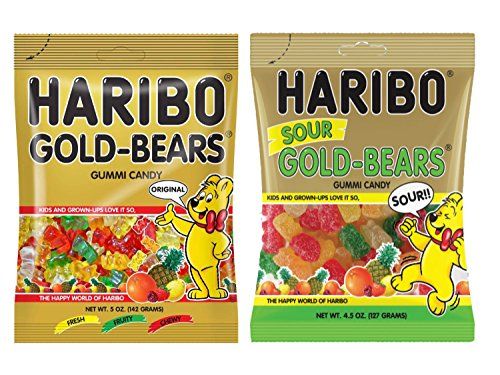Haribo’s Sugar-Free Gummy Bears have become infamous not just for their unique taste but also for the unexpected consequences of their consumption. These chewy confections, often marketed as a guilt-free indulgence for those adhering to low-carb or keto diets, have sparked a plethora of reviews, memes, and even horror stories from unsuspecting consumers. Are you curious about these tantalizing yet perilous treats? In this article, we delve deep into the intriguing world of Haribo Sugar-Free Gummy Bears, exploring their ingredients, health implications, expert opinions, and the impact they have made in the candy industry.

amazon haribo sugar free gummy bears
What Are Haribo Sugar-Free Gummy Bears?
Haribo Sugar-Free Gummy Bears are marketed as a low-sugar alternative to the traditional gummy bear. Using maltitol, a sugar alcohol, as a sweetener, these gummy bears cater to consumers looking for options that align with their dietary restrictions—be it for diabetes management or weight loss. Though this sugar substitute provides a similarly sweet flavor, it is accompanied by some notable side effects that lead many to question whether these bears are truly a guilt-free treat.
Ingredients and Nutritional Profile
Understanding the ingredients of Haribo Sugar-Free Gummy Bears can help consumers make informed choices. In addition to maltitol, the gummy bears contain gelatin, citric acid, natural and artificial flavors, and colors. There’s no sugar, which appeals to consumers who count carbs. Given the rise in popularity of keto-friendly snacks, Haribo’s sugar-free option has struck a chord with an audience eager to indulge without the sugar spike.
The Sweetener Controversy
The remarkable sweetness of Haribo Sugar-Free Gummy Bears comes primarily from maltitol. According to nutritionists, while maltitol is a preferred alternative to sugar, it can lead to significant gastrointestinal distress when consumed in large quantities. Registered dietitian Sarah Schlichter states, “While sugar-free options can be tempting, the body processes sugar alcohols uniquely, which can lead to bloating or diarrhea.” This revealing insight emphasizes the need for moderation when indulging in these treats.
The Side Effects: A Sweet Penalty?
For many consumers, the aftermath of enjoying Haribo’s Sugar-Free Gummy Bears has become a shared experience of digestive distress. Online reviews feature vivid descriptions of embarrassing bathroom experiences, leading to the coining of phrases like “Gummi Bear Cleanse,” which captures the unsettling reality of indulging in these seemingly innocent treats. One review famously stated, “I sit here writing this review at 4AM from my porcelain throne, a fixture you will become all too familiar with if you choose to eat these cute little bears.” Such candid testimonials have fueled a firestorm of interest around these gummy bears.
The Rise of the Gummy Bear Reviews
The web is littered with hilarious, and often horrifying, reviews of Haribo’s Sugar-Free Gummy Bears. From Reddit threads to Amazon review pages, the narrative surrounding these gummy bears has transformed into a cultural phenomenon. Popular figures and influencers have fueled the movement, making these reviews a significant part of internet lore. As comedian Jim Gaffigan humorously remarked, “If you want to know how sturdy your toilet is, eat a bag of these gummy bears.”
Health Considerations and Expert Opinions
Consulting health professionals about the implications of sugar-free sweets is essential. Many dietitians emphasize the importance of understanding how different sugar substitutes affect our bodies. The American Dietetic Association suggests keeping such treats to a minimum, as their effect on gut health is more prominent than one might think. The organization states, “For anyone sensitive to sugar alcohols, it could trigger digestive issues, and a few gummy bears could lead to regrettable decisions.”
Finding Balance: Guilt-Free or Guilt-Ridden?
While indulging in Haribo Sugar-Free Gummy Bears can seem like a healthy treat, balance and moderation are critical. Nutritional experts advise that no food should be consumed in excess, even if it’s labeled ‘sugar-free.’ Emphasis should also be placed on the idea of self-love and self-care when it comes to the choices we make regarding our diets. As famous fitness guru Jillian Michaels says, “It’s not about being perfect. It’s about making progress and finding balance in what you enjoy. Life is about more than just what’s on your plate.”
An Emotional Appeal: The Battle of Treat vs. Treats
The rollercoaster of emotions associated with indulging in such products can be intense. People often experience guilt after consuming treats that conflict with their health goals. However, finding a balance leads to better mental health. “Enjoyment of food is a part of self-love,” claims food psychologist Dr. Linda Sapadin. “We must learn to forgive ourselves and understand that a moderate indulgence isn’t a setback.”
FAQs About Haribo Sugar-Free Gummy Bears
Why did Haribo discontinue sugar-free gummy bears?
Haribo didn’t technically discontinue sugar-free gummy bears, but the sales dwindled due to numerous complaints regarding gastrointestinal distress. It’s essential for manufacturers to strike a balance between consumer demand and health awareness.
What is the sweetener in Haribo sugar-free gummy bears?
The sweetener used is maltitol, a sugar alcohol that boasts fewer calories than sugar but can cause digestive discomfort in larger quantities.
Do sugar-free gummy bears have carbs?
Yes, sugar-free gummy bears do contain carbs due to the presence of maltitol. Typically, a serving contains around 26 grams of carbohydrates, which should be accounted for in a low-carb diet.
Are there any health benefits to sugar-free gummy bears?
They can appeal to those on low-carb diets seeking to satisfy sweet cravings without the sugar spike. However, the potential digestive side effects and the moderation principle should always be kept in mind.
Conclusion: To Indulge or Not to Indulge?
In conclusion, Haribo Sugar-Free Gummy Bears offer both tantalizing flavors and alarming repercussions. They embody the dualities of pleasure and pain, temptation and balance. It’s critical for consumers to remain informed, listen to their bodies, and enjoy these treats in moderation. After all, a healthy lifestyle is founded on balance, self-love, and an occasional indulgence—just maybe not a whole bag of gummy bears at once!